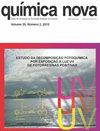ESTUDO DE GASOLINAS PREMIUM E COMUM COMERCIALIZADAS NO BRASIL ATRAVÉS DO MÉTODO ERETIC-RMN E QUIMIOMETRIA
IF 0.5
4区 化学
Q4 CHEMISTRY, MULTIDISCIPLINARY
引用次数: 0
Abstract
STUDY OF PREMIUM AND REGULAR GASOLINES MARKETED IN BRAZIL THROUGH THE ERETIC-NMR METHOD AND CHEMOMETRICS. Gasoline is a complex mixture of hydrocarbons whose detailed study of its chemical profiles is a challenging task. This type of product of great commercial importance has its quality measured in Brazil from classical physicalchemical tests. Although robust, physical-chemical analyses generally require large amounts of assays, solvents, and samples, in addition to not being indicated for the detection of small compositional changes. In this work, NMR and chemometrics were used in the quantitative study of different samples of gasoline with varying ratings of octane and ethanol contents. The results demonstrated the usefulness of NMR spectroscopy both to characterize as well as to distinguish the chemical profiles of regular and premium gasoline. With the application of the ERETIC, the chemical profiles mentioned were quantitatively differentiated and the proportions between hydrocarbons were determined for both types of gasoline. The application of the ERETIC was also successful in the quantitative determination of ethanol contents in regular and premium gasoline. The aforementioned method, which dispenses with the use of quantification standards inserted directly into the sample of interest, was unequivocal in accounting for the volume of ethanol, in addition to showing excellent agreement with the method currently adopted by the Brazilian government.通过ERETIC- nmr方法和化学计量学研究在巴西销售的优质和普通汽油
通过直立核磁共振方法和化学计量学研究在巴西销售的优质和普通汽油。汽油是一种复杂的碳氢化合物混合物,对其化学特征的详细研究是一项具有挑战性的任务。这种具有重要商业价值的产品在巴西通过经典的物理化学测试来测量其质量。物理化学分析虽然可靠,但通常需要大量的测定、溶剂和样品,而且不能用于检测微小的成分变化。在这项工作中,核磁共振和化学计量学被用于定量研究不同的汽油样品与不同评级的辛烷值和乙醇含量。结果表明,核磁共振波谱法在表征和区分普通汽油和优质汽油的化学特征方面是有用的。应用ERETIC,定量区分了上述化学剖面,并确定了两种汽油中碳氢化合物的比例。该方法也成功地应用于普通汽油和高档汽油中乙醇含量的定量测定。上述方法无需使用直接插入感兴趣样本的量化标准,除了与巴西政府目前采用的方法非常一致外,还明确说明了乙醇的体积。
本文章由计算机程序翻译,如有差异,请以英文原文为准。
求助全文
约1分钟内获得全文
求助全文
来源期刊

Quimica Nova
化学-化学综合
CiteScore
1.60
自引率
12.50%
发文量
72
审稿时长
2-4 weeks
期刊介绍:
Química Nova publishes in portuguese, spanish and english, original research articles, revisions, technical notes and articles about education in chemistry. All the manuscripts submitted to QN are evaluated by, at least, two reviewers (from Brazil and abroad) of recognized expertise in the field of chemistry involved in the manuscript. The Editorial Council can be eventually asked to review manuscripts. Editors are responsible for the final edition of QN.
 求助内容:
求助内容: 应助结果提醒方式:
应助结果提醒方式:


